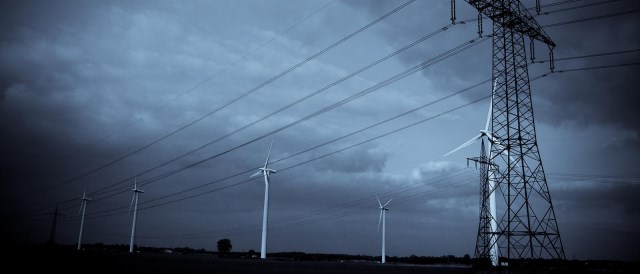Germany does not yet have a new coalition, but the debate about German energy policy reform is in full bloom. Today, Craig Morris talks about the changes that would affect energy corporations – and can’t help noticing the German penchant for market-based instruments and efforts to limit governmental intervention.

The new government will need to tackle challenges around grid development and a possible capacity market. (Photo by FireFace13, CC BY-NC-SA 2.0)
Germany remains wedded to free markets despite the numerous obvious market failures in the energy sector. The solutions proposed will have to be market-based (however defined) if they are to be taken seriously. I see two major market failures that need to be addressed; the list is by no means exhaustive.
Market failure #1: Idle backup capacity unprofitable. Ideally, if a gas turbine only runs for a couple of hundred hours a year rather than a couple of thousand, it should be able to simply charge more so that it remains profitable. In practice, the turbine operator does not know how many hours the plant will run for the rest of the year and simply has to take whatever price the market offers when the turbine has to switch on to meet demand.
Germany will always need a full 80 GW of dispatchable capacity to meet peak annual demand in late November evenings. But Germany is largely switching to wind and solar, which are not dispatchable. Yet, as wind and solar power grow, conventional plants will run less, becoming unprofitable.
The result is a reluctance to invest in new plants – and plans to decommission gas turbines, the most flexible backup capacity. The outcome could be insufficient dispatchable capacity, and the prospect worries supporters of the energy transition. As Rainer Baake, head of Berlin-based think tank Agora Energiewende, recently put it, “We regard this prospect as highly dangerous.”
Payments for capacity – kilowatts instead of kilowatt-hours – should, however, be kept to a minimum and tailored to the plant’s flexibility and carbon emissions. Germany will not need baseload power in a decade, so baseload plants should not receive capacity payments. Furthermore, gas turbines have lower carbon emissions than new, flexible brown coal plants, so the latter should also not be eligible for capacity payments.
 Market failure #2: Grids. Grid operators are uninterested in the guaranteed profit margins of up to nine percent offered for grid investments and have therefore done little to expand the grid. In one prominent case, grid operator Tennet – a 100 percent subsidiary of the Dutch state – would have to make investments exceeding its entire annual revenue.
Market failure #2: Grids. Grid operators are uninterested in the guaranteed profit margins of up to nine percent offered for grid investments and have therefore done little to expand the grid. In one prominent case, grid operator Tennet – a 100 percent subsidiary of the Dutch state – would have to make investments exceeding its entire annual revenue.
Here, we see the German reluctance to have the government step in and fix everything, for the obvious solution would be that the government should take over Germany’s for transmission grid zones as natural monopolies – something Denmark did years ago. But don’t hold your breath; it ain’t gonna happen.
The obvious solution is forcing investors to swallow losses. Grid operators like Tennet currently have to pay for offshore wind they cannot transport, but the costs are simply passed on to consumers as a higher grid fee. Investors in offshore wind be treated the same as those investing in onshore wind; the latter cannot simply continue building and be paid in full for power not sold to the grid if the grid is not expanded in time. Grid operators could pay offshore investors part of the sum, forcing them to tailor their plans to the grid, and grid operators should have to book such payments as a penalty – so they have to pay something if they fail to provide a connection.
The result would be slower growth in the offshore wind sector, which is not a big problem – what the Energiewende and needs most is wind power, and onshore will do the trick just fine. Another result would be more distributed onshore wind power, which would probably strengthen community projects. In my next post, I discuss the role that citizen investors will play in focusing on onshore wind.
Craig Morris (@PPchef) is the lead author of German Energy Transition. He directs Petite Planète and writes every workday for Renewables International.
Craig —
America’s Power Plan dug in on this question — how can markets deliver the flexibility that renewables need? Mike Hogan, formerly of the European Climate Foundation, now with the US Regulatory Assistance Project, wrote that paper. You can find it at http://americaspowerplan.com/the-plan/power-markets/.
I look forward to your thoughts on it, and how it might be applied to Germany.
In regards to “Market failure #1: Idle backup capacity unprofitable.” – currently we have a MO result above 2800,00€/MWh for PRL. Maybe we have to think about new ways to model load balancing….